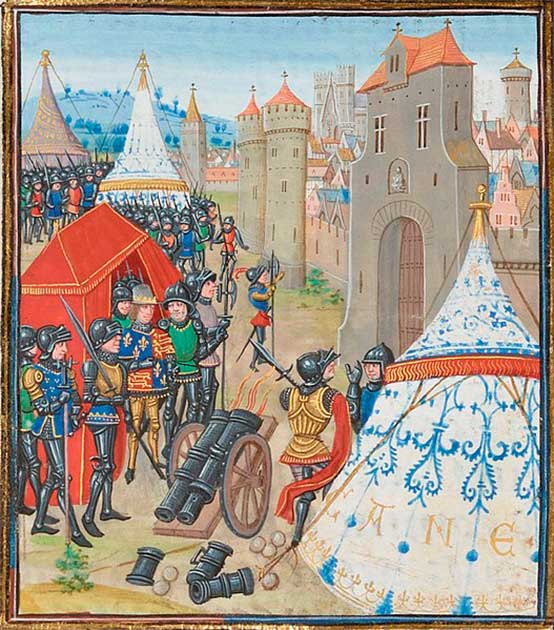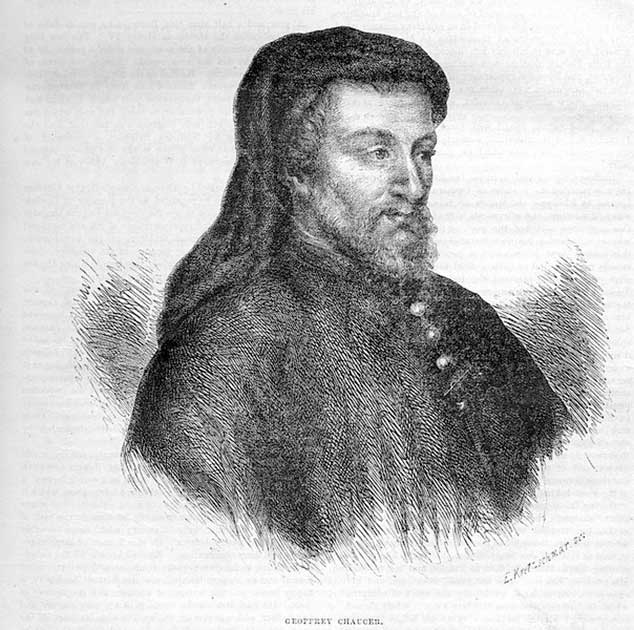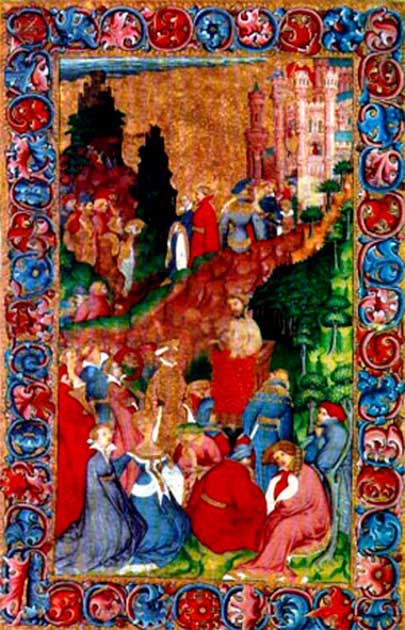Geoffrey Chaucer was one of the most famous English poets of the 14th century. His most famous work The Canterbury Tales is ranked as one of the great poetic works of England.
As well as this, Geoffrey contributed to the management of public affairs as a diplomat, courtier, and civil servant. He served three kings of England: Edward III, Richard II, and Henry IV.
Despite his prominence in the English Court, it is for his poetry that he is most well-known and fondly remembered. Chaucer’s work varies in subject matter, tone and style all the while capturing the pursuit of sensible existence while it is littered with humorous and philosophical questions.
However, it has been suggested that the well-known poet was actually a spy for the monarchy. How did this come to be and what happened to him?
Early Ambitions
Chaucer’s family for four generations had been London-based middle-class English people who had a connection to the court which had steadily increased over the years. His father, John Chaucer, was an important London vintner (someone who operates a winery) and a deputy to the King’s butler.
John was favored in court, a member of Edward III’s expedition to Antwerp and a landowner with property in Suffolk, northeast of London. Geoffrey Chaucer himself was perhaps born in 1342 or 43 but no information exists on his early education.
It is assumed that he would be fluent in French and Middle English. This would have been paired with an understanding and competency in Latin and Italian. Chaucer’s writings show that he was familiar with his contemporary books and those of earlier times.
Chaucer’s first appearance in the official records comes in 1357 when he was a youth. He is known as a member of the countess of Ulster’s household, who was the wife of Lionel, the third son of Edward III.
- Sir Francis Walsingham: Who was Queen Elizabeth’s Spymaster in Chief?
- Who Was Aleister Crowley…Occultist, Satanist, and British Spy?
Chaucer’s father had managed to place him among the group of young people serving the royal household which in turn allowed for education in the court and huge advancement for their careers. Two years later in 1359, Chaucer was a member of Edward III’s army in France, but was captured at Reims during an unsuccessful siege.

To give an idea of how important this young man was to the king, Edward contributed to the ransom personally and worked to have him released. Chaucer then served as a messenger between England and Calais during the peace negotiations between England and France in 1360.
Geoffrey then disappears from the records for the next four years, slightly mysteriously. He was probably in the king’s service but may have also been studying law.
He finally reappears in 1366 as the King of Navarre issued a certificate of safe conduct for him and three companions. This marks the first of many diplomatic missions that Chaucer would serve as the “chief of mission” across Europe in the 14th century.
In 1366, Geoffrey also married Philippa Pan. She had been in the service of the Countess of Ulster and was now in the service of Philippa of Hainaut, the Queen Consort of Edward III. By 1367, Chaucer received an annuity as a yeoman for life. He was later listed among the King’s esquires.
These roles saw him live in court and work on diplomatic missions as well as military service. It was not much later that Chaucer published his Book of the Duchess, a sign of his connections with high-status individuals.
Agent for the Crown
Geoffrey Chaucer’s reputation as a spy seems to stem from his career in the royal service. There is no doubt that he worked with the crown to create diplomatic relations across Europe.
From 1359-1378, Chaucer was recorded numerous times as the head of diplomatic delegations. The missions were recorded as “the king’s secret business”, though how much this suggests that he was acting as a spy for the English crown is unclear.

The documents that do exist of this period show Chaucer scouting paths across the Pyrenees mountains so that English forces, who were poised to invade Spain, knew some of the terrain. Other reports show that he lobbied Italy for money and troops and also spent time investigating the death of Lionel of Antwerp.
Lionel had died suddenly, which raised suspicions as he was a political player on the continent and in England. Many contemporaries suspected that the English prince was poisoned soon after his wedding.
Geoffrey Chaucer likely came into contact with some of the most dangerous and darkest figures of the day. He met with the King of Navarre, known as Charles the Bad. He is also thought to have met Bernabo Visconti, a Lord of Milan who helped to devise a 40-day torture protocol. Yikes.
One of the key pieces of evidence that suggest that Chaucer was a spy is in his poetry. Chaucer’s success may be down to his love of playing characters and the assumption of different characters which can be seen in his work.
Chaucer’s style is not a preachy one, he uses his characters to use a turn of phrase or piece of comedy to relate his tales. The Wife of Bath for example tells about the misogyny of her five husbands, offering a female viewpoint rather than a lecture from Chaucer himself.
Better at Writing
One of the earliest indicators that Chaucer was beginning to pull away from public life and focus on his writing is in 1374. Edward III granted Chaucer a gallon of wine every day for the rest of his life (we should all be so lucky), but it was never specified what it was for.

The only indication is that this boon was granted on St. George’s Day, a day when artistic endeavors were celebrated. Though this boon only lasted until Edward III died in 1378, that is still a lot of wine.
Chaucer continued to be in public life and continued to work for the King in the 1380s but also moved away to Kent. During this time, it is thought that he began and finished writing the Canterbury Tales.
Records of his life in retirement from public service become patchier as time goes on, but he does feature in various law cases and as a foreman of the King’s works in 1389. It seems his retirement was complete.
Chaucer died in 1400 of unknown causes. Some speculate that he may have been murdered, but little can be proved. It may have been some of his espionage work coming back to bite him.
Top Image: Geoffrey Chaucer at the court of Edward III. Source: Ford Madox Brown / Public Domain.
By Kurt Readman